Index relies entirely on the support of donors and readers to do its work.
Help us keep amplifying censored voices today.
A Kenyan woman speaking out for women in one of the world’s most dangerous regions and a female journalist who exposed an unreported uprising in Saudi Arabia are among the winners of this year’s Index on Censorship Freedom of Expression Awards.
“Our shortlisted nominees are all tackling direct and serious threats to stifle free speech,” said Index on Censorship CEO Jodie Ginsberg. “We were humbled and inspired by their stories, and their dedication to ensuring we can all speak freely.”
The awards were presented at a ceremony at The Barbican, London, hosted by comedian Shappi Khorsandi whose father Hadi was forced into exile from Iran because of his satirical writing.
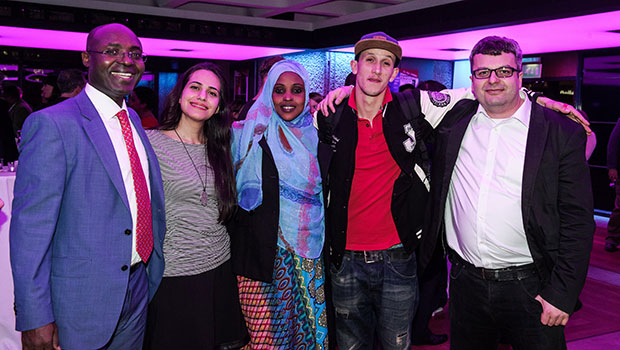
Index on Censorship 2015 Freedom of Expression award winners: Rafael Marques de Morais (journalism), Safa Al Ahmad (journalism), Amran Abdundi (campaigning), Mouad “El Haqed” Belghouat (arts) and Tamas Bodoky (digital activism) (Photo: Alex Brenner for Index on Censorship)
Awards are presented in four categories: journalism, arts, campaigning and digital activism. The winners were Saudi journalist Safa Al Ahmad and Angolan reporter Rafael Marques de Morais (journalism – jointly awarded); Moroccan rapper “El Haqed” (arts); Kenyan women’s rights campaigner Amran Abdundi (campaigning); and Hungarian freedom of information website Atlatszo (digital activism).
The crime of free expression
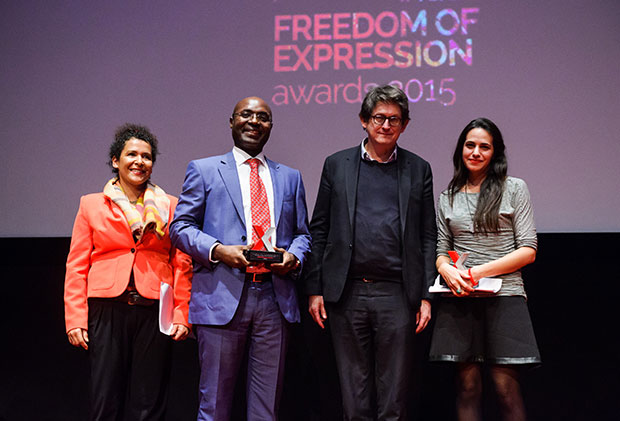
Journalist and campaigner Mariane Pearl, journalism award recipient Rafael Marques de Morais, Guardian editor Alan Rusbridger and journalism award recipient Safa Al Ahmad (Photo: Alex Brenner for Index on Censorship)
Al Ahmad was recognised for her documentary Saudi’s Secret Uprising, which exposed details of an unreported mass demonstration in Saudi Arabia. “Safa Al Ahmad dared to go into places that are difficult for women and for reporters, to bring that information back and share it with the world,” said Turkish author Elif Shafak, one of the five judges. Saudi Arabia is a mystery, even to its own people, said Al Ahmad in her acceptance speech: “Parts of our history is deliberately concealed, the present is muddled with rumours and half-truths. The government-owned and controlled media play a major role in the dissemination of those false realities of ourselves and others. This makes facts a precious commodity in Saudi Arabia.”
Angolan investigative reporter Marques de Morais has been repeatedly prosecuted for his work exposing government and industry corruption and will go on trial on 24 March charged with defamation. “Rafael is a very important individual doing very important work in a very, very difficult environment,” said judge Sir Keir Starmer QC. Marques de Morais dedicated his speech to the Zone 9 group of Ethiopian bloggers currently in jail “for the crime of exercising their right to freedom of expression”.
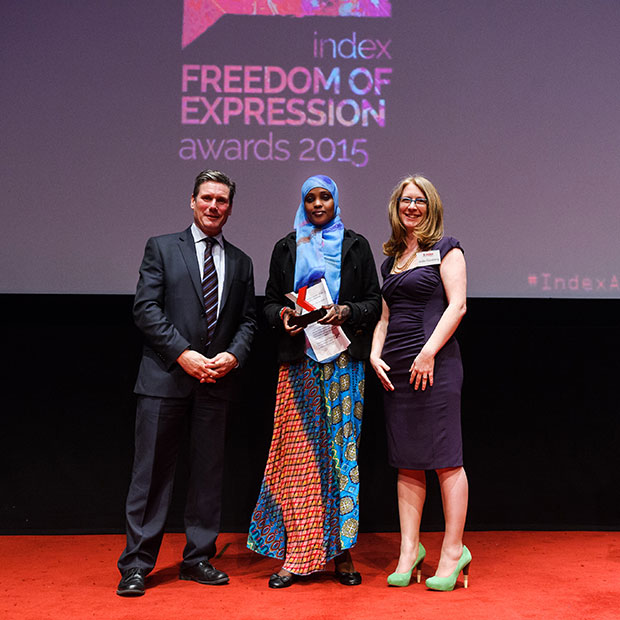
Doughty Street barrister Keir Starmer, campaigning award recipient Amran Abdundi and Index on Censorship CEO Jodie Ginsberg (Photo: Alex Brenner for Index on Censorship)
The winner in the campaigning category, Amran Abdundi, is a women’s rights activist based in north-eastern Kenya and runs a group helping women along the dangerous border with Somalia, where terrorism and extremist violence dominate. Judge Martha Lane Fox said: “Amran Abdundi was a standout candidate for me. She is doing something incredibly powerful in an unbelievably complicated and dangerous situation.” Abdundi dedicated her award to the “marginalised women of northern Kenya… who will now know that their struggles and their efforts to fight for their rights are being recognised internationally”.
Help us let the world know the truth
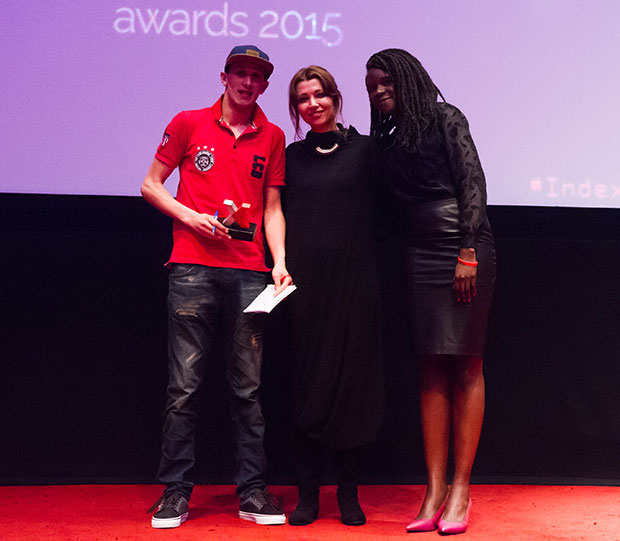
Arts category winner Mouad “El Haqed” Belghouat, novelist Elif Shafak and actor Stella Odunlami (Photo: Alex Brenner for Index on Censorship)
Arts category winner Mouad “El Haqed” Belghouat is a Moroccan rapper and human rights activist whose music highlights widespread poverty and endemic government corruption in Morocco. He has been imprisoned on spurious charges three times in as many years, most recently in 2014. Belghouat said in his acceptance speech: “I have been through difficult times: I was jailed, fired from my work, rejected by many friends. I am still forbidden to sing in my own country. But after all that I am still determined that I will never change my position. I will fight for freedom, equality and human rights for ever.” Lane Fox said Belghouat had taken his music and “translated it into a kind of online activism, but then, crucially, mobilised people in the street”.
The digital award, decided by public vote, went to Hungarian investigative news outlet Atlatszo.hu managed by Tamás Bodoky. The website acts as watchdog to a Hungarian government which has increasingly tightened its grip on press freedom in the country. Editor-in-chief Bodoky said Atlatszo.hu called on all those who believe that independent journalism in Hungary is under threat. “All those who agree that politics and business interests have sunk their claws into everyday life. All those who know that taxpayer money is vanishing. We are calling on you to help us let the world know the truth.”
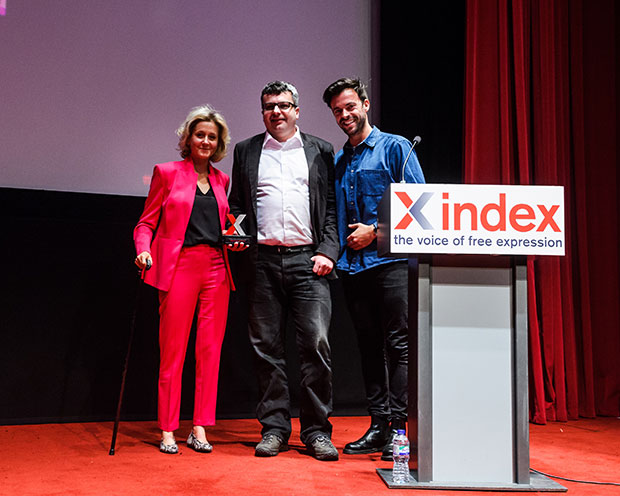
Entrepreneur Martha Lane Fox, digital activism award recipient Tamas Bodoky and actor Jolyon Rubinstein (Photo: Alex Brenner for Index on Censorship)
The awards were presented by the judges along with special guests including Guardian editor Alan Rusbridger.
A special award was also given on the evening to honour the many Azerbaijani journalists and activists jailed or forced into exile or hiding following a recent crackdown by the government. Former award winner and journalist Idrak Abbasov, who was forced to flee Azerbaijan last year, accepted the award on behalf of all those facing persecution in the country. “I call upon the world community to help Azerbaijan… so that our colleagues might be released and that our country might become a normal state in which we and others might live freely,” Abbasov told the audience in a video speech.
The evening featured an exhibition of specially commissioned cartoons by international cartoonists, reflecting on the past 12 months for free expression. Most of the artists had direct experience of persecution over their work, including Syrian political cartoonist Ali Ferzat – a former Index award winner – and Malaysia’s Zunar. “In the wake of the attacks on Charlie Hebdo, we wanted to pay homage to the work of cartoonists who are so often the first to face censorship in any move to stifle free expression,” said Index’s Jodie Ginsberg.
Related
• Safa Al Ahmad: Facts are a precious commodity in Saudi Arabia
• Rafael Marques de Morais: I believe in the power of solidarity
• Amran Abdundi: This award is for the marginalised women of northern Kenya
• El Haqed: I will fight for freedom, equality and human rights for ever
• Tamas Bodoky: The independence of journalism in Hungary is under threat
• Special Index Freedom of Expression Award given to persecuted Azerbaijani activists and journalists
• Video: Comedian Shappi Khorsandi hosts Index on Censorship awards
• Drawing pressure: Cartoonists react to threats to free speech
An earlier version of this article stated that Rafael Marques de Morais will go on trial on 23 March. The date is 24 March.
This article was posted on 18 March 2015 at indexoncensorship.org
Both as a journalist and human rights activist, Rafael Marques de Morais has exposed government and industry corruption in Angola – speaking out for those whose human rights have been violated in his country. Despite repeated arrests and threats, including a 40-day detention without charge during which he was denied food and water for days, Marques de Morais has continued his investigations, most recently detailing human rights abuses within Angola’s diamond companies – including 500 cases of torture and 100 murders of villagers living in the vicinity. After filing charges of crimes against humanity against seven Angolan generals, Marques do Morais is now being counter-sued for $1.6 (£1.09) million. Undeterred, he continues to write on corruption in Angola. He is the joint recipient of the 2015 Index on Censorship Freedom of Expression Award for Journalism.
With an award comes a greater responsibility. It is therefore my privilege to accept this journalism award, and dedicate it to my fellow Ethiopian colleagues Eskinder Nega, Reeyot Alemo, and the Zone 9 bloggers. They are in jail, currently serving some of the harshest sentences in Africa, for the crime of exercising their right to freedom of expression. For over a year, the Ethiopian government has denied adequate health care to Reeyot Alemu, who is in desperate need.
Ethiopia is the seat of the African Union, and its regime is one of the worst offenders for upholding the freedoms of the press and of expression. When a regime in Africa succeeds in trampling their citizens’ rights with impunity, and enjoys such good international standing and legitimacy as Ethiopia, it becomes a textbook case for other authoritarian regimes.
I believe in the power of solidarity. I have experienced troubles of my own. It has been the solidarity of others that has helped to strengthen my courage and resolve to continue my journey.
Back in 1996, being in London and aghast at press censorship in Angola, I decided to bring it to international attention. Because I could not speak English, I fumbled through an organization’s directory, and found Index on Censorship. I could understand the word Censorship. I called them and attended a meeting on Africa. My remarks were most convincing and incredibly short! “Censorship in Angola bad. Dos Santos [the president] bad. Very bad!” Then, a few months later I had an article translated and published in Index’s magazine. It was disseminated through other publications in a number of countries.
On my return to Angola from this trip, I will be sitting in court, on 24 March, as the defendant on 11 separate charges of defamation brought against me by seven powerful generals and four of their business associates. I wrote a book that exposed human rights abuses in the diamond industry, in which the plaintiffs are major shareholders and whose private security company has executed many of the violations.
I am proud and honored to stand up against such a mighty power to enable many of the victims to speak out through my reports, which I have been producing for the past 10 years. I will come out of this trial stronger and empowered by the experience.
Thank you very much for this wonderful occasion.
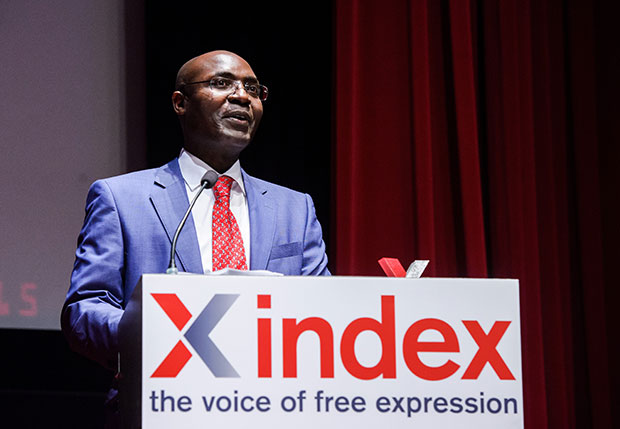
Journalist and human rights activist Rafael Marques de Morais (Photo: Alex Brenner for Index on Censorship)
Related
• Index announces winners of 15th annual Freedom of Expression Awards
• Safa Al Ahmad: Facts are a precious commodity in Saudi Arabia
• Amran Abdundi: This award is for the marginalised women of northern Kenya
• El Haqed: I will fight for freedom, equality and human rights for ever
• Tamas Bodoky: The independence of journalism in Hungary is under threat
• Special Index Freedom of Expression Award given to persecuted Azerbaijani activists and journalists
• Video: Comedian Shappi Khorsandi hosts Index on Censorship awards
• Drawing pressure: Cartoonists react to threats to free speech
Rafael Marques de Morais is an Angolan journalist and human rights activist. He is currently facing nine charges of defamation after publishing on human rights abuses committed during diamond mining operations in Angola. Since 2008 he has run an anti-corruption watchdog news site called Maka Angola – “maka” means a serious, nuanced problem.
Marques has dedicated his career to investigating his country’s maka: ingrained corruption in Angolan government and industry, and the repeated violation of Angolans’ human rights. This culminated in his 1999 article The Lipstick of Dictatorship, which said Angolan President José Eduardo dos Santos was propagating the country’s civil war to distract attention from his regime’s “incompetence, embezzlement and corruption”.
In retaliation, Marques was arrested and detained for 40 days without charge, during which time he was denied food and water for days at a time. His six-month sentence for defamation of dos Santos was then suspended on condition that he wrote nothing critical of the government for five years. Within three years he was writing a series of reports documenting government-sponsored human rights abuses in Angolan province Cabinda.
Journalists in Angola are routinely threatened for speaking against the state – seven have been murdered since 1992, including a pro-opposition radio presenter who was shot in 2010. Rights activists are also targeted. In November 2014, a female student was beaten for two hours by a group of police officers for taking part in an anti-government demonstration.
In terms of its natural resources Angola is one of the world’s richest countries, with extensive deposits of oil and diamonds under its surface. The end of the country’s civil war in 2002 paved the way for enormous economic growth: in the subsequent decade the government budget grew from $6 billion to $69 billion, as oil and diamond sales rocketed.
But this financial influx hasn’t trickled down to the Angolan populace, 70 per cent of whom still live on less than $2 a day. Angola is ranked 161st out of 175 countries in Transparency International’s Corruption Perceptions Index. It’s easy to see why – between 2007 and 2010 $32 billion in oil revenue went unaccounted for in government ledgers.
Recently Marques has focused on following money trails between government figures and business leaders, especially in diamond and oil industries. A highlight of this work is his 2013 collaboration with Forbes magazine investigating the president’s daughter Isabel dos Santos, and the provenance of her $3.9 billion wealth. dos Santos, styled ‘Princess’ of Angola, is the richest woman in Africa – but Marques’ thorough investigations reveal the extent to which her father used his power to cut her into business deals.
Marques’ leading investigative work into corruption and human rights abuses at Angola’s diamond companies was distilled into his 2011 book Blood Diamonds: Torture and Corruption in Angola. He recounted 500 cases of torture and 100 murders of villagers living near diamond mines, carried out by private security companies and military officials.
Marques declared the bosses of these groups morally responsible for the atrocities committed under them, and filed charges of crimes against humanity against seven Angolan generals. After his case was dropped by the prosecution, the generals launched a series of retaliation lawsuits in Angola and Portugal, charging Marques with criminal libel. They are demanding a total of $1.6 million from Marques. The case will begin in March 2015.
In spite of the impending trial, last month Marques began publishing a series of pieces on land-grabbing generals who have displaced agrarian workers around Angola.
This article was posted on 19 February 2015 at indexoncensorship.org